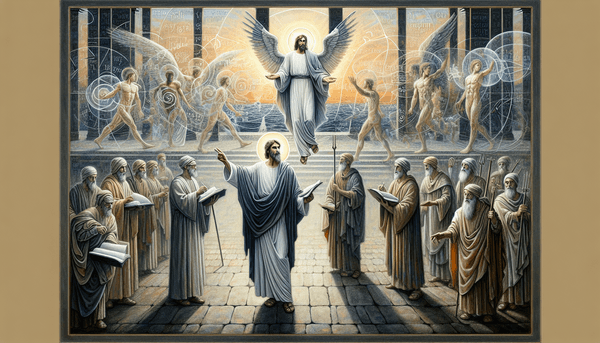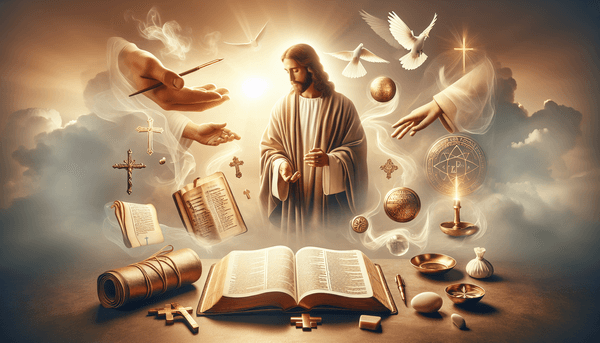The Significance of Matthew Chapter 2
In Matthew Chapter 2, we are presented with a narrative that sets the tone for the entire Gospel. The arrival of the Magi, seeking the \"king of the Jews,\" as noted in Matthew 2:2, symbolizes the recognition of Jesus by the Gentiles. Their journey from the East and the gifts they bring are a testament to Jesus' kingship and divinity. This event is contrasted with King Herod's hostile response, who, feeling his throne threatened, seeks to kill the infant Jesus. This chapter not only underscores the opposition Jesus faced from the outset but also his family's flight to Egypt, fulfilling the prophecy, 'Out of Egypt I called my son' (Hosea 11:1), emphasizing Jesus as the fulfillment of the Old Testament prophecies. The lamentation heard in Ramah, as Jeremiah 31:15 describes, echoes the tragic outcome of Herod's decree, further indicating the path of suffering that would mark Jesus' life.
The Role of John the Baptist in Matthew Chapter 3
The narrative shifts in Matthew Chapter 3 to focus on John the Baptist, a prophetic voice crying out in the wilderness, urging the people to 'Repent, for the kingdom of heaven is at hand' (Matthew 3:2). His message of repentance and the baptism he offers symbolize the cleansing and preparation needed for the coming Messiah. John's role is to prepare the way for Jesus, fulfilling the words of the prophet Isaiah, 'Prepare the way of the Lord' (Isaiah 40:3). The baptism of Jesus by John marks a pivotal moment when Jesus is publicly affirmed as the beloved Son of God (Matthew 3:16-17), signifying his divinity and the commencement of his public ministry. This chapter emphasizes the importance of repentance and spiritual readiness, setting the stage for Jesus' transformative work.
Jesus' Temptation and Ministry in Matthew Chapter 4
After his baptism, Jesus' temptation in the wilderness, as narrated in Matthew Chapter 4, showcases his humanity and his victory over sin. For 40 days, he fasts and faces the devil's temptations, countering each with Scripture, demonstrating the authority of God's Word. 'Man shall not live by bread alone' (Matthew 4:4) and 'You shall worship the Lord your God and him only shall you serve' (Matthew 4:10) are declarations of Jesus' commitment to God's will above all else. Following this period of testing, Jesus begins his public ministry in Galilee, calling his first disciples with the promise to make them 'fishers of men' (Matthew 4:19) and preaching about repentance and the nearness of the kingdom of heaven (Matthew 4:17). His ministry of teaching, healing, and proclaiming the good news illustrates the dawning of a new era in redemptive history.
Conclusion
The early chapters of Matthew offer a wealth of knowledge and guidance for those seeking to understand the life and teachings of Jesus Christ. From the events surrounding his birth to the profound teachings of the Sermon on the Mount, these passages reveal the Messiah who fulfills prophecy, teaches with authority, and exemplifies perfect love and righteousness. Reflecting on these themes invites us to deepen our faith through the practices of asking, seeking, and knocking, as we live out the principles of the kingdom of heaven and prepare ourselves spiritually for the challenges of life. The Gospel of Matthew encourages us not only to learn about Jesus but to follow his example and become beacons of light in a world that desperately needs the hope and love he offers.
FAQ
Q: What's Matthew Chapter 5 trying to say?
A: Matthew Chapter 5 is the beginning of Jesus' Sermon on the Mount, where he outlines the principles of the kingdom of God, including the Beatitudes, and teaches about inner righteousness, love, and the fulfillment of the law.
Q: How do I become righteous?
A: Righteousness comes through faith in Jesus Christ, who grants moral purity and right standing with God to those who believe, not through human efforts but as a gift of grace.
Q: What is righteousness?
A: Righteousness refers to being in a right relationship with God, characterized by moral integrity, justice, and adherence to God's will, which is exemplified in the life and teachings of Jesus.
Q: What is the Armor of God?
A: The Armor of God is a metaphorical concept described in Ephesians 6:11-17, representing the spiritual defenses provided to believers, such as truth, righteousness, the gospel of peace, faith, salvation, and the Word of God, to stand against evil.






